Publications
For submission of articles or Working Papers to CEsA, please send an email to:
comunicacao@cesa.iseg.ulisboa.pt
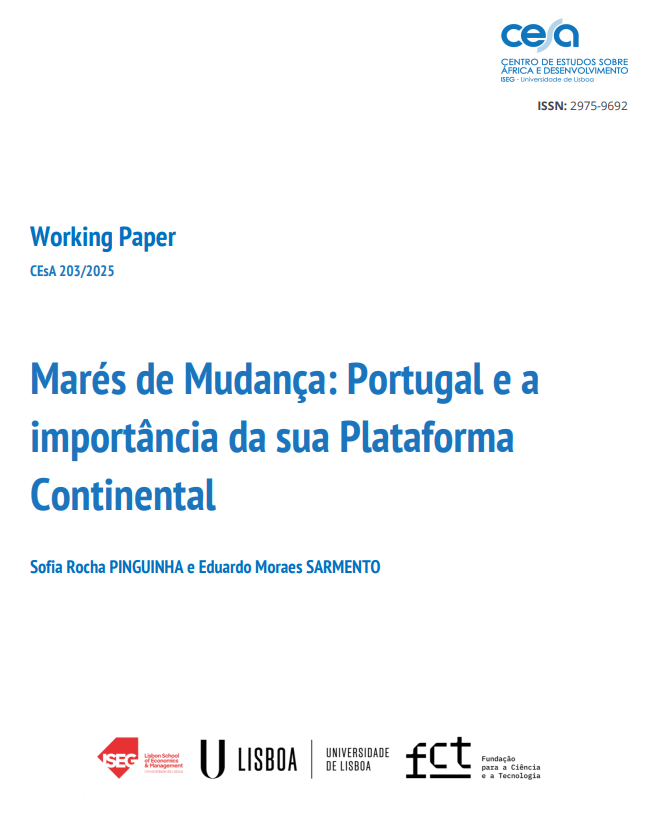
Working Paper 203/2025: Marés de Mudança: Portugal e a importância da sua Plataforma Continental
Abstract:
Portugal, known for its historic maritime traditions, is currently immersed in a strategic ambition regarding the expansion of its continental shelf driven by geopolitical, economic and environmental factors, placing the country before a dynamic maritime scenario full of challenges and opportunities. The rise of the blue economy, synonymous with a sustainable economy, redefines the indispensability of the ocean and its centrality in the balance of building the sustainable development that is sought globally (Cristas, 2022). Using a qualitative methodology, the aim is to reflect on the main benefits that Portugal can obtain from the possible approval of the expansion of its continental shelf, by the United Nations Organisation (UNO). The future, according to the National Strategy for the Sea 2021-2030 (República Portuguesa, 2021), should involve defining a strategy, based on a system of alliances, that will allow Portugal to move forward with the sustainable exploitation of the marine resources (Seguro, 2022).
Cite this Working Paper:
Pinguinha, Sofia Rocha and Eduardo Moraes Sarmento (2025). “Marés de Mudança: Portugal e a importância da sua Plataforma Continental”. CEsA/CSG – Documentos de trabalho nº 203/2025
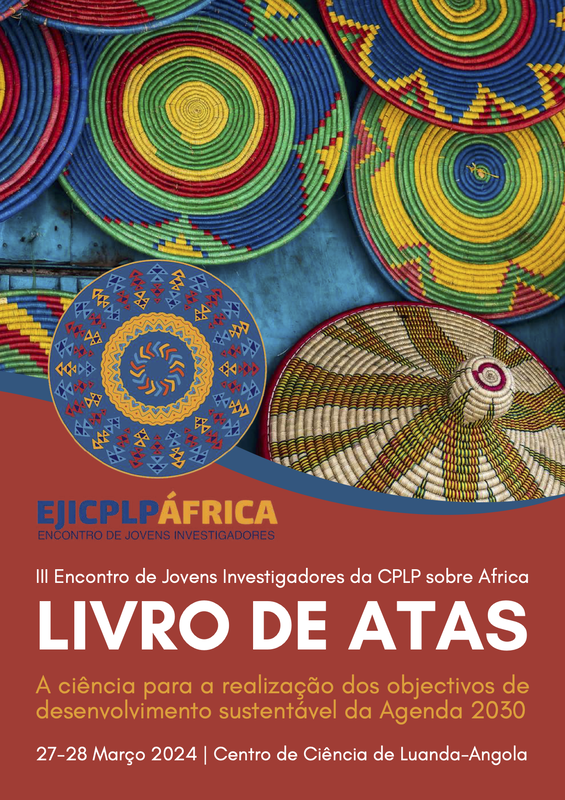
Ebook – 3rd EJICPLP Africa: A ciência para a realização dos Objectivos de Desenvolvimento Sustentável da Agenda 2030
Abstract:
It is with great pleasure that we present the outcomes of the 3rd Meeting of Young Researchers from the CPLP on Africa, held in Luanda on 27 and 28 March 2024. This event, which has already established itself as a key platform for science and development within the Community of Portuguese Language Countries (CPLP), brought together more than 700 participants around the theme “Science for the Achievement of the Sustainable Development Goals of the 2030 Agenda,” fostering a fertile environment for the exchange of ideas, reflections, and collaborations.
With around 30 speakers, including senior researchers, experts, and high-level national and international institutional representatives from various fields of study, eight thematic panels were discussed to deepen knowledge about Africa and its sustainable development, particularly in the areas of Tourism, Energy, Education, Economy, and African Women. The event addressed critical issues related to poverty eradication, environmental protection, and social prosperity. This edition highlighted the role of science in transforming African realities, reflecting on the implementation of the Sustainable Development Goals (SDGs) in the context of the Global South.
The importance of this Meeting goes beyond the impressive number of participants or the lively discussions that marked the two days of activities. The event is a unique scientific forum for young people across the CPLP and brings together a vibrant network of researchers in an itinerant and innovative format. It represents the collective effort of young researchers to give voice to issues that directly affect the development and future of their countries, reinforcing the scientific leadership of CPLP youth.
In this edition, 35 scientific papers by young researchers were presented, selected from among the 65 papers received through the Call for Papers, by a Scientific Committee composed of 30 professors from various universities in CPLP countries.
This book is more than a simple collection of articles; it represents the dedication of young researchers who strive to redefine the role of science in their societies. Through the discussions and analyses presented here, we hope not only to inspire new debates, but also to encourage concrete actions in support of inclusive and sustainable development in CPLP countries.
With the crucial support of the Centre for African and Development Studies (CEsA) and partner organisations such as Angola’s Ministry of Higher Education, Science, Technology and Innovation, and Felcos Umbria, this edition also demonstrates the value of collaboration and international partnerships essential to the success of this project.
We hope these pages offer an enriching perspective on the scientific contributions of Portuguese-speaking youth, as well as concrete actions towards inclusive and sustainable development, particularly in the PALOP countries.
We believe this book marks a milestone on the path towards a more open, collaborative, and transformative science.
Cite this e-book:
D’Abril, Cristina Molares e Jessica Falconi (2024). “III EJICPLP África: A ciência para a realização dos Objectivos de Desenvolvimento Sustentável da Agenda 2030”. ISBN: 978-989-54687-6-8
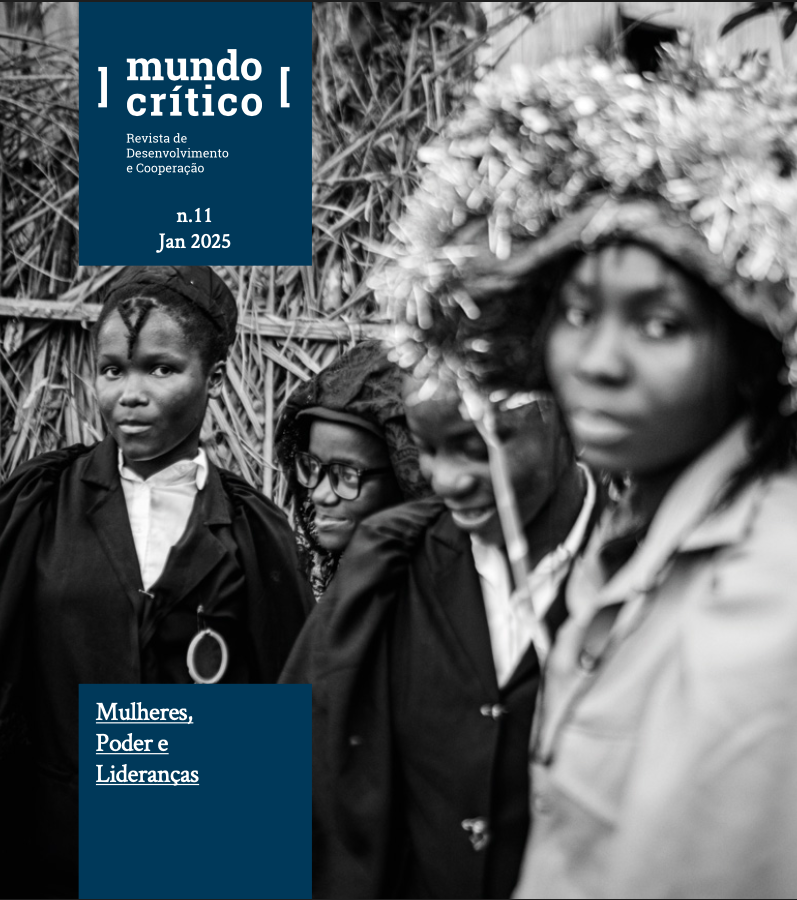
Mundo Crítico # 11: Mulheres, Poder e Lideranças
Abstract:
While it is widely recognised that equitable participation in political life is essential to development processes, data from across the globe unfortunately show that women remain underrepresented at all levels of decision-making, and gender parity in political life is still far from being achieved.
Women’s relationship with power and their possibilities of accessing leadership positions are marked by a constant negotiation between the private and public spheres, regardless of their context of action.
This issue of Mundo Crítico offers a critical and diverse reading—both geographically and historically—on the ways in which relationships between women, power, and different forms of leadership are articulated. The aim is to foster a more nuanced understanding of the mechanisms and values underpinning the functioning of societies.
In the Imperfect Conversation, historians Ana Paula Tavares and Patrícia Godinho Gomes discuss the everyday challenges faced by women in African countries, focusing on the concept of generation and the importance of female participation in the process of building today’s independent nations.
Other contributions reflect on the global difficulties women face in accessing power, and how their political participation also takes shape in more informal contexts—spaces where they create conditions for their own survival.
The photo essay For a New Tchiloli by Dário Pequeno Paraíso shows how tradition can be reinvented and renewed, presenting portraits of young women from São Tomé and Príncipe who reinterpret one of the archipelago’s most iconic cultural expressions through a female lens.
Cite this Journal:
ACEP & CEsA (2025). “Mulheres, Poder e Lideranças”. ISEG/CEsA – Centro de Estudos sobre África e Desenvolvimento. Revista Mundo Crítico nº 11 (Jan 2025). ISSN 2184-1926
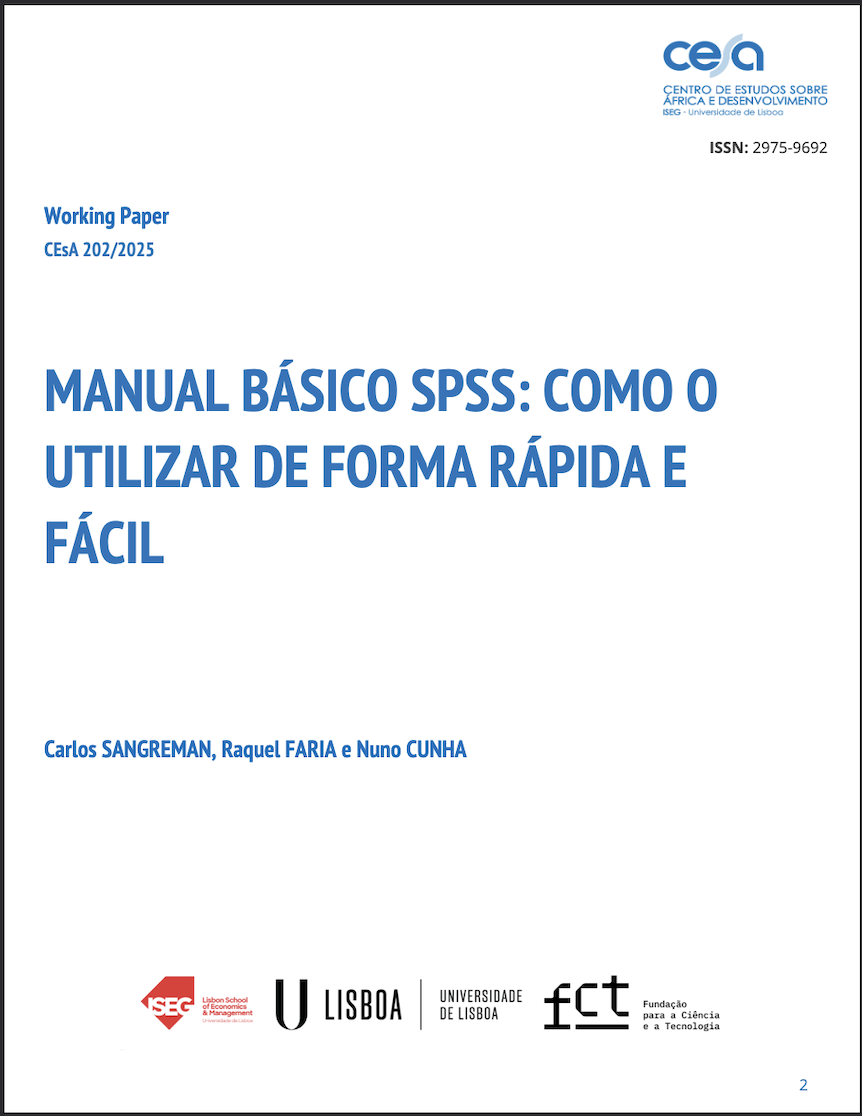
Working Paper 202/2025: Manual básico SPSS: como o utilizar de forma rápida e fácil
Abstract:
This manual aims to explain a quick and effective way to use IBM SPSS Statistics for data entry, management and analysis. In other words, the way in which data can be approached in the field of social sciences using descriptive statistics, demystifying its use.
Cite this Paper:
Sangreman, Carlos; Raquel Faria e Nuno Cunha .(2025). “Manual básico SPSS: como o utilizar de forma rápida e fácil”. CEsA/CSG – Documentos de trabalho nº 202/2025
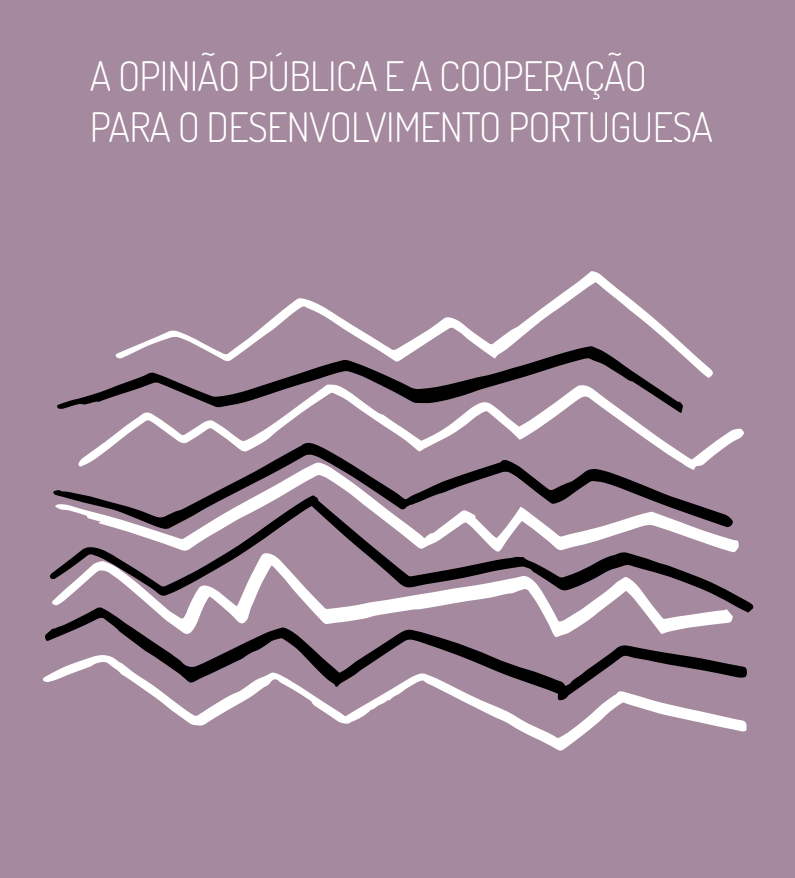
A Opinião Pública e a Cooperação para o Desenvolvimento Portuguesa
Abstract:
Almost 20 years after the first public opinion poll on the role of Development Cooperation, particularly Portuguese Cooperation, we have launched a new study to find out what Portuguese society thinks about this sector, at a time when a new strategic cycle of Portuguese Cooperation is underway. In this sense, the Association for Cooperation Between Peoples (ACEP) proposed to the Centre for African and Development Studies of the Lisbon School of Economics and Management (CEsA/ISEG) and to the Department of Social Sciences and Territorial Policies of the University of Aveiro (DCSPT/UA) a process of updating knowledge about Portuguese public opinion, in order to provide a more reliable view of opinions in this area and better plan strategies for dialogue and public debate with different sectors of society, including national political decision-makers and journalists.
The Portuguese Cooperation Strategy 2030 highlights, among other things, the importance of communication with society and the visibility of the sector to allow for greater understanding and recognition of its role in the calculation of Portuguese public policies. In fact, in Portugal, Development Cooperation continues to occupy a residual space in the political debate, especially at the level of the Assembly of the Republic and the media, and there are still difficulties in approaching and working systematically with Portuguese MPs and journalists and in placing the issues of Development and International Cooperation in the media.
Over the last 20 years, International Development Cooperation has undergone profound changes, which Portuguese Cooperation has not been immune to. Although it is a policy about which there is little institutional debate at national level, it is a crucial sector in the way Portugal relates to the world, particularly with some of the countries with which it maintains strong bilateral relations, such as the PALOP and East Timor. This relationship does not only involve the State, but also involves a wide range of sectors, both public and private, for-profit and non-profit, approaching Development Cooperation in different ways and giving rise to different types of relationships.
This survey did not come about in a vacuum and is naturally not immune to the current international context, which is particularly adverse and poses additional challenges to Development Cooperation. However, this public policy has a unique role in promoting Development, peace and human rights. Current conflicts, in particular the wars in Gaza and Ukraine (which marked the return of war to Europe), the disrespect for and discredit of International Law and multilateralism, as well as the rise of populist discourse throughout the world and, particularly in Europe, are elements that characterise the environment in which Development Cooperation needs to continue to assert itself and strengthen itself as the noblest expression of the foreign policy of States and international institutions.
Cite this book:
ACEP & CEsA (2024). “A Opinião Pública e a Cooperação para o Desenvolvimento Portuguesa”. ISBN 978-989-8625-35-9

Working Paper 201/2025: A Glance at International Challenges of Refugee Crises in the New Millenium
Abstract:
This study investigates the intricate relationship between forced displacement and human development. By examining refugee outflows from key regions, this paper seeks to comprehend the factors driving these movements and their development implications. Employing a qualitative case study methodology, the research focuses on the five main refugee outflow countries in 2023. The paper finds that the most relevant factors that induce displacement are political violence, especially civil conflict, and climate change. Refugee emergencies have multiple aggravating elements, like economic crises, food insecurity, and infrastructure damage. Despite not identifying strong correlations between displacement and human development (measured through HDI), except for Syria, the study reveals that these emergencies are simultaneously humanitarian and developmental challenges. Repercussions are more prominent in the Global South since it is the origin and the destination of over 70% of displaced people. The findings reiterate the urgency for integrated policy responses that combine development and humanitarian efforts.
Cite this Working Paper:
Rocha, Marcela e Eduardo Moraes Sarmento (2025). “A glance at international challenges of refugee crises in the new millenium”. CEsA/CGS – Documentos de trabalho nº 201/2025

Entre eu e Deus by Yara Costa: An Unprecedented Representation of the Island of Mozambique
Abstract:
This article aims to dissect the documentary Entre eu e Deus with the primary objective of demonstrating that the director sets out to challenge images, representations and crystallized perceptions of the Island of Mozambique, Mozambican cultural identity and Islamic fundamentalism, and that she succeeds in doing so. The article consists of two main sections. The first provides a brief historical context of the Island of Mozambique and examines some visual representations that predate the documentary under analysis. Here, I pay particular attention to Licínio Azevedo’s documentary on the Island of Mozambique as a relevant antecedent of Yara Costa’s work. The second part provides a detailed analysis of Entre eu e Deus, demonstrating the director’s unprecedented representation of the Island of Mozambique.
Cite this Paper:
Falconi, J. (2024). Entre eu e Deus by Yara Costa: An Unprecedented Representation of the Island of Mozambique. Portuguese Studies 40(2), 175-188. https://dx.doi.org/10.1353/port.00014.

Claude Meillassoux em Moçambique: a propósito de uma carta a Marcelino dos Santos
Abstract:
Claude Meillassoux, the founder of French economic anthropology, and Marcelino dos Santos, an important leader of the Mozambique Liberation Front (Frelimo), met in Paris in the 1950s, when they were both studying with the Africanist Georges Balandier. In 1977, the year of Meillassoux’s first visit to Mozambique, their relationship was renewed, this time under a critical and controversial tone. That year, Frelimo had transformed itself into a “Marxist-Leninist” vanguard party and was on the verge of creating a series of organizations in favor of the establishment of “people’s power” and socialism. Meillassoux would become a keen observer of this process. This article reconstructs the vicissitudes of his trip, promoted by the Franco-Mozambican cooperation and the Center for African Studies at Eduardo Mondlane University. Immediately after his visit, Meillassoux sent Marcelino dos Santos a highly critical letter concerning the course of the Mozambican revolution. The article also analyzes the content of this letter and its main anthropological and political implications.
Cite this Paper:
Macagno, L. (2024). Claude Meillassoux em Moçambique: a propósito de uma carta a Marcelino dos Santos. Estudos Ibero-Americanos, 50(1), e45089. https://doi.org/10.15448/1980-864X.2024.1.45089

African women’s trajectories and the Casa dos Estudantes do Império
Abstract:
This article compares the trajectories of different women who crossed the Casa dos Estudantes do Império (CEI), a formal institution created in Lisbon by students from the colonies with the support of the Portuguese dictatorial regime in 1944, that became a platform for anti–colonialism. Due to the role played by the CEI in the political and social paths of the leaders of African national liberation movements, historiography has privileged masculine accounts. In contrast, the roles and lives of women linked to the CEI remain unexplored or approached from a vision of “methodological nationalism”, with few exceptions. Addressing these trajectories from a transnational and “Afro–Iberian” lens and through the scrutiny of several sources allows us to reflect on a diversity of gender, race, class, and political ideology. The final aim is to illuminate some aspects of the Afro–Iberian mosaic from a gendered and postcolonial perspective.
Cite this Book Chapter:
Falconi, J. (2024). African women’s trajectories and the Casa dos Estudantes do Império In: Ethnicity and Gender in Portugal and Spain. volume 47, issue 7 (2024), pp. 1403-1419
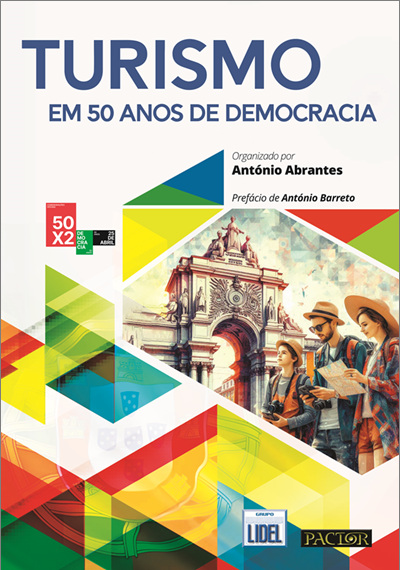
Uma viagem sobre a investigação e a inovação no turismo
Abstract:
This chapter aims to succinctly outline the evolution and trends in the type of research that has been conducted, its connection to knowledge innovation issues, and, above all, whether this trend aligns with the major lines of action in the tourism sector at the international level. Fifty years after April 1974, tourism has established itself both globally and nationally as a resilient and impactful activity on multiple levels, as well as a strategic instrument for strengthening development between countries and peoples.
As a corollary of this dynamism, there has also been a growing recognition of the importance of its role in professional, polytechnic, and university education, as well as the role attributed to research in this field. Research serves as a means to contribute to a thorough understanding of tourism’s significance, informed decision-making, and, naturally, the preparation of a well-trained workforce capable of navigating a highly competitive global market.
Cite this Book Chapter:
Sarmento, E. (2024). Uma viagem sobre a investigação e a inovação no turismo. In António Abrantes, Turismo em 50 anos de democracia (Parte IX- Ensino, Formação e Investigação no Turismo. Cap. 49, pp.398-406). ISBN: 978-989-693-188-9. Lisboa: Pactor/LIDEL





